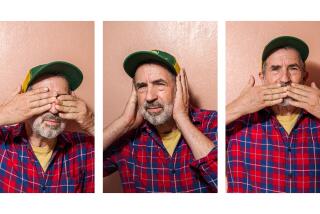Chevron sues over ‘Crude’
- Share via
Journalism that serves society does not always spring from objectivity, nor is it always written from a distance. When Upton Sinclair exposed the conditions of Chicago’s meat industry, he did so on assignment from a socialist newspaper. He went to work in grim stockyards and returned with “The Jungle.” The result was a revolution in food safety and the founding of the Food and Drug Administration.
For the record: An earlier version of this editorial incorrectly said that the federal judge’s order had come down this week.
Sinclair’s closeness to his story gave his journalism urgency and moral power. It was precisely the sort of work that deserves the greatest protection from corporate intrusion. That lesson, however, has been turned upside down by a New York federal judge who earlier this month ordered a documentary filmmaker to turn over outtakes of his work to Chevron.
The man at the center of this important 1st Amendment battle is Joe Berlinger, a respected documentary filmmaker who launched a project in 2005 to chronicle a landmark lawsuit filed by Ecuadoran indigenous people seeking compensation for environmental damage. Berlinger’s acclaimed documentary, “Crude,” followed the case, focusing on the lawyers for the plaintiffs. Chevron, however, says several scenes reinforce the company’s charge that those lawyers cooked up the case: In one, a lawyer for the plaintiffs meets with an expert witness hired by the government to estimate damages from oil in the Ecuadoran jungle; in another, a lawyer is shown meeting with the judge and remarking that such a meeting would be inconceivable in the United States but not in Ecuador, because there “this is how the game is played. It’s dirty.” Because just a fraction of Berlinger’s footage made it into the final film, Chevron believes there was potentially more damaging material left on the cutting-room floor, so it sought to force Berlinger to hand over his outtakes.
Were the material in question notes gathered by a journalist in pursuit of a story, the journalist’s privilege, which recognizes the societal benefit of allowing journalists to shield their unpublished notes, would almost certainly have protected it. So the issues were: Was Berlinger a journalist, and do the protections for notes extend to film outtakes? U.S. District Judge Lewis Kaplan sided with Berlinger on both points, concluding that the filmmaker covered a newsworthy event and disseminated his findings to the public — a fairly sound description of journalism in any form.
Nevertheless, noting that the journalist’s privilege is a limited one, Kaplan ordered Berlinger to turn over the footage precisely because, paradoxically, Berlinger’s close ties to the plaintiffs meant that he has material that Chevron is unable to get anyplace else. (Kaplan seems to have overlooked the presence of other witnesses in the filmed scenes.) Kaplan may be right that Berlinger has exclusive material, but forcing him to relinquish it turns the point of journalistic access on its head: If journalists must reveal what they learn but do not publish from those sources they cultivate most carefully, then sources will keep them at arms’ length. This nation is better off because Sinclair was able to insinuate himself into Chicago’s meatpacking plants; it will be better again if Berlinger prevails on appeal. And it will be better still when Congress passes a federal shield law that protects journalists and their sources.
More to Read
Sign up for Essential California
The most important California stories and recommendations in your inbox every morning.
You may occasionally receive promotional content from the Los Angeles Times.










